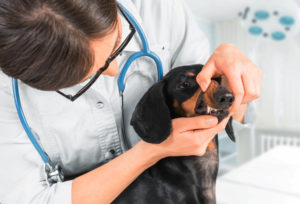Pet Dental Health Month
Your pet’s dental health is much more complex than just maintaining a dazzling, pearly white smile. Though easy to overlook, our pets’ oral hygiene should be taken very seriously. With February being Pet Dental Health Month, there is no better time to begin awareness and maintenance of your pet’s oral hygiene.

“Oral hygiene has a direct effect on the overall health of your pet,” said Dr. Bert Dodd, clinical professor at the Texas A&M College of Veterinary Medicine & Biomedical Sciences. Dental disease affects a significant number of pets during their lifetime, and just like with people, there can be serious consequences accompanied with poor dental health.
The belief that our pets are supposed to have foul breath is a common misconception. Although their breath certainly won’t smell like roses, extremely foul odor can be the first sign of a severe dental problem. “Often, exceptionally bad breath is the first indicator of oral disease,” said Dodd. Some other indicators of oral disease may include excessive drooling, inflamed gums, and loose teeth.
“Periodontal disease, or gum disease, is a disease of neglect,” said Dodd. “If preventative dental health is not practiced, and periodontal therapy ignored, other health complications may follow.” The infected areas of the mouth contain bacteria that can then spread through the bloodstream to other parts of the body such as the heart, kidneys, or liver. Preventing such detrimental side effects is possible with regular upkeep and awareness.
Dental care for your pet should begin early on, so it is vital that your veterinarian teach you how to properly care for their teeth and gums right away. Veterinarians can provide demonstrations of the most effective and hassle-free way to brush their teeth, as well as which diets and toys are the safest and most effective.
Another important step in caring for your pet’s dental health is to provide them with complete teeth cleaning under anesthesia with your pet’s veterinarian. “Oral examinations and cleaning should be performed on your pet at least once a year,” said Dodd. “They should be performed more frequently if home care can’t be done or if there are other oral problems.”
In addition to annual oral examinations, daily home dental care is vital. “Home care includes everything from brushing, using proper dental chews, water additives, and dental diets,” said Dodd. A toothbrush and toothpaste specifically made for pets, as well as wipes and pads, are just a few items to invest in.
Like regular grooming and exercise, dental care should become a routine for both you and your pet to strictly follow. Regular tooth brushing, accompanied by annual oral examinations and at home checkups, will lead to one happy pet with a dazzling and healthy smile.
Pet Talk is a service of the College of Veterinary Medicine & Biomedical Sciences, Texas A&M University. Stories can be viewed on the Web at vetmed.tamu.edu/news/pet-talk. Suggestions for future topics may be directed to editor@cvm.tamu.edu.


